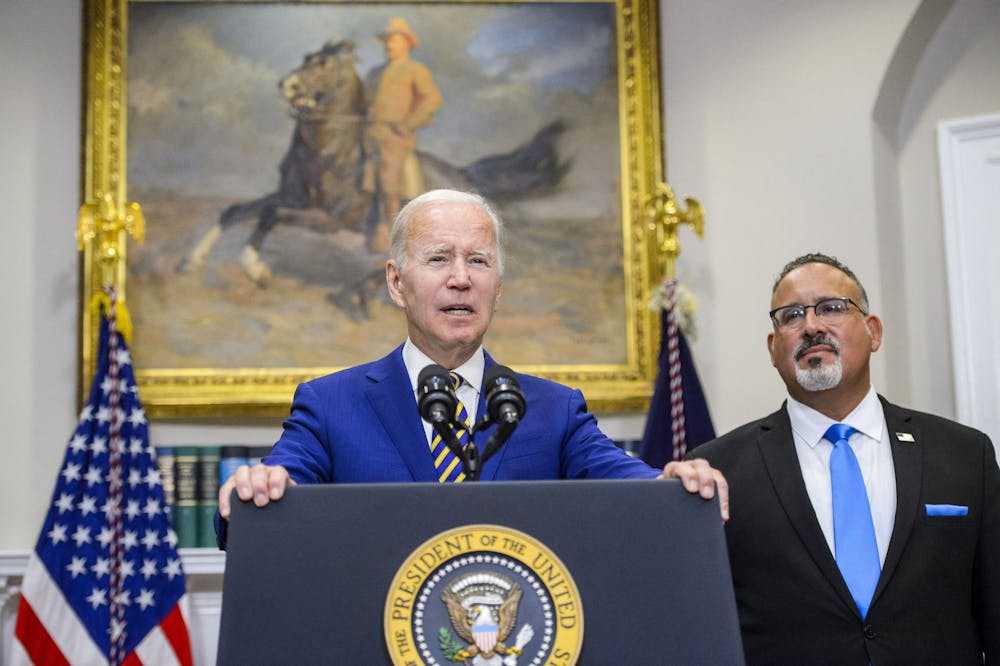As the Biden administration announced its plans to cancel up to $20,000 of student loan debt for some borrowers, I was reminded of the Irish socialist James Connolly’s poem about the demands of socialists: “Our demands most moderate are, we only want the earth!”
So, in that spirit, it must be said that while Biden’s policy is a good start and will help millions of people, it doesn’t go far enough. Why stop at $20,000 for Pell Grant recipients, and $10,000 for those with slightly higher incomes? The president should cancel all $1.6 trillion of it, and new debt should never be collected again.
[Related: Biden announces up to $20K in federal student loan debt will be forgiven]
We must ask ourselves, as Americans, what kind of society we want to live in. Do we want to live in a society where everyone has an equal opportunity to be educated?
Countries like Sweden, Norway and Ireland answer in the affirmative and offer free higher education. Denmark even pays its students to go to school. These societies see the benefits of investing in young people, and studies show a well-educated workforce is beneficial to the economy.
Americans don’t live in such a society. Because of the sky-high prices of higher education, we live in a society where financial burdens are the reason nearly half of all college dropouts abandon pursuing an education.
Less than half of Americans over the age of 25 have a college degree. A 2021 survey of Americans without college degrees found financial barriers to be the most cited reason for not having attended college, according to Pew Research.
This isn’t to mention students who earn a degree only to find themselves crushed by debt. The Biden administration is right when it points out massive student loan debt makes it difficult for people to buy homes, put money away for retirement and start businesses.
The student debt crisis is a particular problem for people of color. According to the Brookings Institution, Black households carry more student debt, which pushes down their creditworthiness, which leads to lower home ownership, and so on. Student debt is a poison to our society in seemingly endless ways.
[Related: OPINION: We have a gross misunderstanding of the degree of wealth inequality in the U.S.]
But conservatives, and some liberals, have grievances with even such timid policy proposals like the Biden administration’s debt cancellation. Let’s examine these arguments.
“Cancelling student loan debt is unfair to those Americans who never went to college or already paid off their loans.” This is the most popular rallying cry of reactionaries lately. Our elders have said, “life isn’t fair,” all our lives — now these same people whine about unfairness!
Many of our homes have never burned down – do these fairness warriors propose we stop funding the fire department? Perhaps conservatives will join us on the Left, and demand the cease of taxpayer funds to Israel? No? Such silly arguments about fairness from those who support unfettered capitalism can only be met with laughter.
As for those who already paid off their loans, congratulations. But must we all suffer as you did?
“Biden’s plan doesn’t address already outrageous tuition costs, and debt cancellation might encourage universities to raise the price of attendance.” This is half of a good argument. It’s true Biden’s plan doesn’t address the excessive cost of admission — that’s why I say college should be free.
The other criticism — colleges might be encouraged to raise prices — should be met with regulatory preparedness. If Biden’s policy emboldens universities to raise costs, the administration must find a way to punish them. But to reject a policy that will help millions of people out of debt because universities are holding a financial gun to our heads is unacceptable. We must disarm them.
For those on the Left like myself, we shouldn’t let right-wing flailing get us down. Some debt cancellation is good. But it isn’t everything — it isn’t our most “moderate” demand of the world. That comes next.
Jared Quigg (he/him) is a junior studying journalism and political science.




